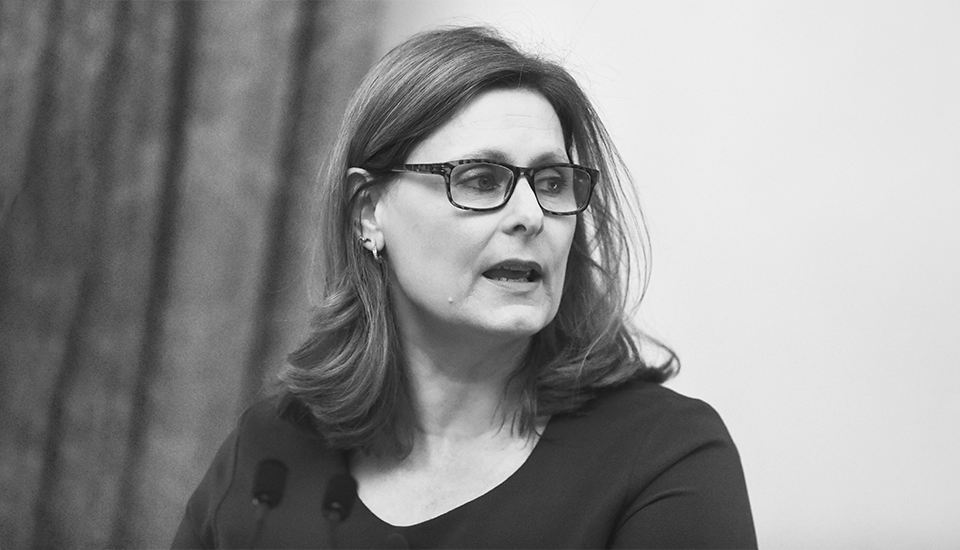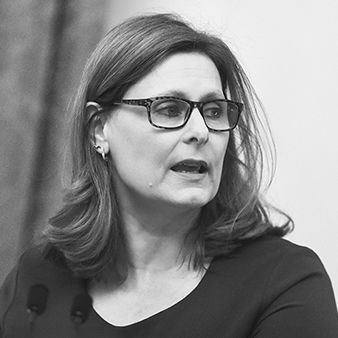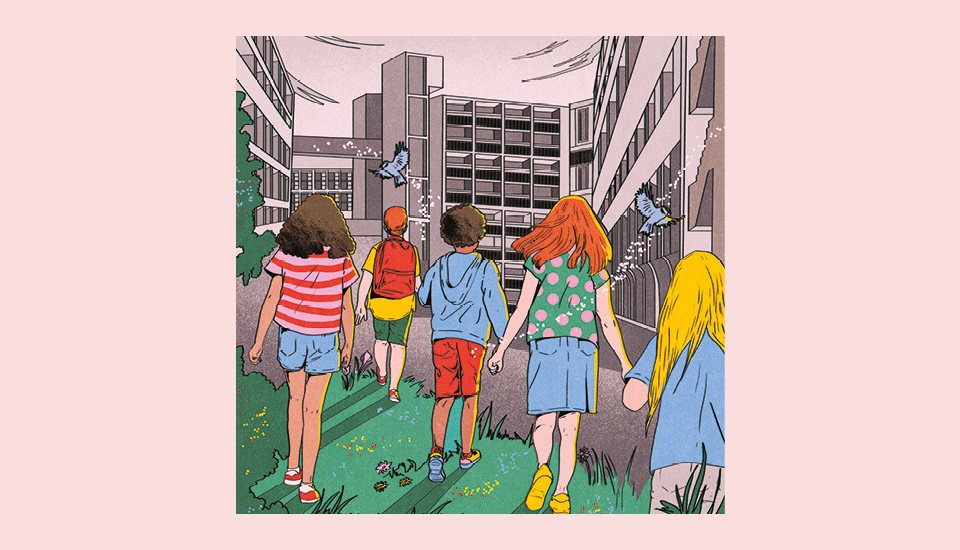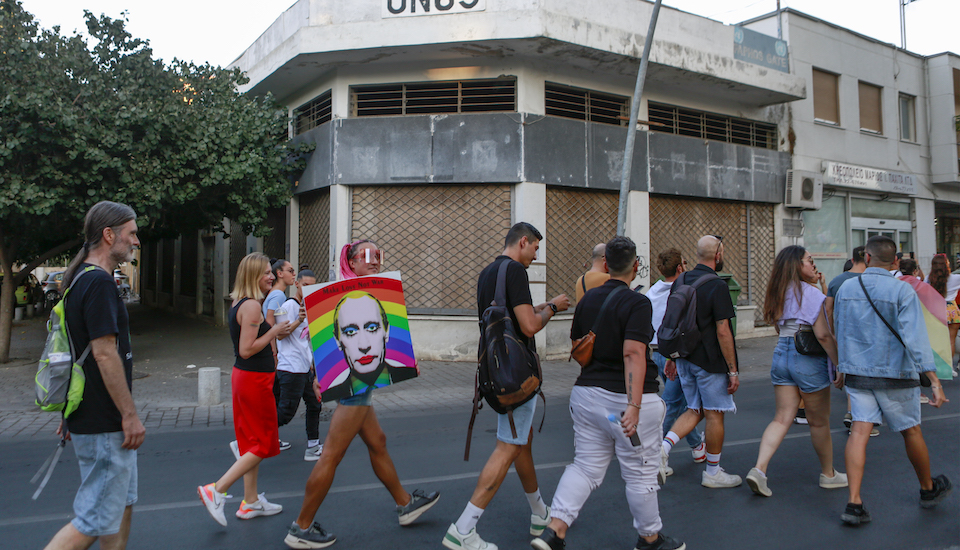“We cannot sit back and accept that 260 million children don’t get to go to school.”
Sarah Brown, Chair of Theirworld and Executive Chair of the Global Business Coalition for Education, is interviewed by Rachel O’Brien.
Rachel O’Brien: Thanks for agreeing to talk to us about the work you do through the global children’s charity Theirworld, which you were part of setting up in 2002. How did this come about?
Sarah Brown: My background was in health campaigning and, in particular, maternal health campaigns. Initially, the charity had a UK focus, looking at ‘community-up’ lessons to improve children’s lives. Health and education were the obvious starting points and we started with science-based evidence on what gives children the best start in life. But we were equally interested in ideas that might come from teachers, midwives, nurses or community workers and where they might pitch for funding for a project they thought would improve people’s lives.
For the first eight to 10 years, we were funding really interesting small projects where we could measure impact and assessment, scaling some up. Around 2010 we made a gear change to do more international work. The biggest barrier to meeting health and nutrition goals – even social justice goals – for children around the world, is lack of access to quality education and the lack of opportunity, particularly for girls, to be able to stay in school and thrive. It was here that we could leverage our youth campaigning networks and the knowledge and experience of community projects to talk to people at the very top international decision-making levels about what would make the greatest difference.
We used our campaigning expertise and found ways to collaborate, bringing in other non-governmental organisations who had an interest in education, improving the impact of our ask. This included coordinating a petition of 11m signatures and drawing on various well-known people and organisations who would stand alongside the petition when it was presented to the UN Secretary General. The outcome was a new fund to finance education for children in emergencies. Until then, if a child was a refugee, there was no education opportunity for them because, historically, being a refugee was a short-term problem, so the emphasis was on obtaining shelter and accommodation, emergency medical care and food. But people were staying as refugees for so much longer, sometimes for many of their childhood years.
As we learn more about the impact of trauma on mental health, we understand that very quickly putting in stability, and something that’s a bit more familiar and structured around learning, gives you an opportunity to also offer trauma support. We worked to change the environment in order to quickly provide education in emergencies.
The second thing that really stands out is the work we’ve done on the refugee crisis sparked by the long-running Syrian war. In 2013, more than 500,000 school-aged Syrian refugee children were living in Lebanon and very few were in school. The proposal that we put into action was the double-shift schools solution, so that when a country suddenly needed to host a large number of children, they could provide education very quickly and at a reasonable cost. They would simply run a school with two shifts to accommodate all the children. That’s something that may feel obvious now, but we drove that through.
We also created a cohort of Global Youth Ambassadors. Our programme, which runs for two years, currently includes nearly 2,000 ambassadors between the ages of 18 and 30 from 90 countries. These young people want to do something that has a wider impact and contribute to a global campaign effort, but they also learn skills from us to take forward into their own activism within their communities or, more broadly, within their own countries. This work was followed up at the 2016 World Humanitarian Summit in Turkey and out of it grew the Education Cannot Wait fund, a multibillion-dollar global education fund within the UN to support children who have been forced to flee their homes.

As soon as we disrupt our own society and have to keep children away from school, we find it’s not just the maths and English that children are missing out on, but so much more
O’Brien: Obviously the last two years must have been exceptional. In general, do you still feel a sense of progress, or does it feel exhausting to see things fall back?
Brown: The pandemic makes everything so much harder. It’s now clear that well over 90% of children around the world lost education, who will now need catching up. When Covid-19 struck, we reacted swiftly. In Lebanon, the double impact of Covid-19 and the country’s economic crisis meant children with special educational needs were hit hard by a lack of learning and therapy sessions. We supported the SKILD Center in Mount Lebanon creating short videos featuring activities to enhance children’s emotional, cognitive, motor and speech abilities. The project exceeded all expectations, and the digital lessons and support were accessed more than 400,000 times.
We face a world where half of young people by 2030 won’t have the skills for employment or be able to generate their own income. We’ve had very, very poor investment in early years. Funding is being cut and international development budgets are being slashed, while politicians are shrugging their shoulders and going ‘well, there’s only so much we can do’.
When you’re in the middle of change, you sometimes feel like things aren’t progressing at all. But then you look back five or 10 years, and huge progress has been made, in that education is higher up in visibility and political support for understanding why it’s so essential for future skills. There is also growing recognition of the importance of early childhood development and the difference that can be made when a child starts school and can continue, not just for their education, but for their health and the wider planet. I see progress through the UN’s Sustainable Development Goals being set at country levels with the cooperation of corporations and philanthropists, and a much greater understanding in civil society about what is needed.
O’Brien: Do you get impatient about the UK agenda, especially because we’re incredibly lucky when compared to many of the nations you talk about?
Brown: I’ve never been patient in my life! What I’ve noticed in the UK, which reinforces the case that we make globally, is that the issues that came up during the pandemic were around children’s time with each other socially, around nutrition and holiday hunger, around the impact of school closures on communities. It proves the case again, that where you’re able to provide education and educational spaces, you’re also providing a nutritious meal, you’re providing socialisation, you’re providing ways to citizenship. These are things that we know, theoretically, but we sometimes pretend we don’t need to worry about in other parts of the world. As soon as we disrupt our own society and have to keep children away from school, we find it’s not just the maths and English that children are missing out on, but so much more.
O’Brien: Every nation is different, but do you think there is a broad acceptance that economic and development progress absolutely relies on parity in girls’ education?
Brown: There’s a very strong move for it and all the evidence stacks up behind it. Where you invest in girls, you’re investing in them, their family, their community and their wider society. When a mother can read, her children are 50% more likely to live past the age of five, twice as likely to attend school, 50% more likely to be immunised. In too many parts of the world, girls have been historically left out of schooling. No one is suggesting that you invest in girls at the expense of boys, but there is equal evidence to show that investment in girls will have a greater yield and that every time you invest in a girl’s schooling her earnings are going to increase. We know now that education can transform the entire quality of life for that young woman.
Young people are having these conversations and have such a strong connection with each other through social media and technology, which is leading to greater global integration. All of those conversations about what gets taught and how are really, really vital, and young people are quite remarkable in the way they’re driving the demand for inclusion of diverse histories, culture and life choices.
O’Brien: In 2012, Theirworld founded the Global Business Coalition for Education, which has a membership of over 100 private sector companies. What is driving that support?
Brown: We started the Global Business Coalition for Education because we’d seen a version of it in health that was a really strong and vital force within the world of funding for global health projects. The advent of the Global Health Fund made such a difference right away with HIV/AIDS and malaria, and later with crises such as Ebola. We wanted something similar for education so created it ourselves with the support from the GBCHealth people, who gave us their playbook to set it up. It’s been a really interesting journey because we’re bringing in a lot of big peer global PLCs from around the world, and each of these big companies has its own approach. Some of them are doing the work directly as companies, some of them through their own charitable foundations. While ‘youth skills’ is certainly a theme for a lot of them, others are focused on where education and environment intersect, or early childhood education, or around play and play development and mental health issues. Regardless of differences, though, you find a deep commitment from companies now, particularly as they start to integrate environmental, social and governance metrics into their work
O’Brien: What do you think are the biggest threats within the area you’re working on?
Brown: What always troubles me are the big global meetings. We’ve seen what happened with the G7 or with COP26. While there is some progress, everyone walks away from it saying, ‘we didn’t do enough’ or ‘there’s a target set’, and then targets are not met. At Theirworld, it is our job to work with projects and communities around the world to see how the targets for education can be met.
We must be more ambitious about the funding; we cannot sit back and accept that 260 million children don’t get to go to school. We have a growing crisis in Afghanistan for girls’ education, a war in Syria that’s still not ending, different consequences in different parts of Africa if availability of Covid-19 vaccines isn’t expanded. But it does feel like there’s a sense of urgency and there has been a huge amount of work done on innovative ways to finance education with some phenomenal opportunities in 2022. In September, the UN will look at this very specifically at its Transforming Education Summit, and we’ve also got the World Education Forum in May. There’s a growing acknowledgement that you can put a certain amount of money into the pot, but you’re going to have to use government guarantees to leverage that money so that we’ve got enough financing. We need to stop mucking about and properly unlock the political will to finance education to the level that’s really needed.
Sarah Brown is Chair of Theirworld and Executive Chair of the Global Business Coalition for Education.
- To find out more about Theirworld, visit www.theirworld.org
-
Photo attributions: The cover image is the work of the Education Commission/Theirworld. The embedded image and author image is the work of Stuart Wilson/Getty Images for Theirworld.
This article first appeared in the RSA Journal Issue 1 2022.
Related articles
-
Young at heart
Journal
Jonathan Prosser
Becoming a nation with children at its centre in 10 courageous steps.
-
Open RSA knowledge standards
Blog
Alessandra Tombazzi Tom Kenyon
After investigating ‘knowledge commons’, we're introducing our open RSA standards and what they mean for our practice, products and processes.
-
Worlds apart
Comment
Frank Gaffikin
We are at an inflexion point as a species with an increasing need for collaborative responses to the global crises we face.




Be the first to write a comment
Comments
Please login to post a comment or reply
Don't have an account? Click here to register.